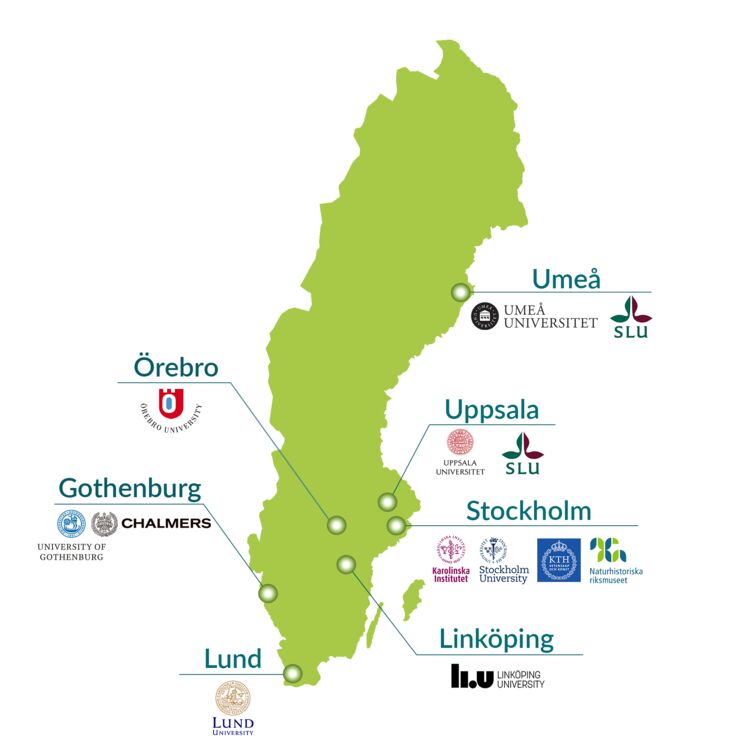SciLifeLab Linköping aims to connect local researchers with the national infrastructures at SciLifeLab.
Research infrastructure at other sites
SciLifeLab is available nationally at all major universities in Sweden. All sites and universities provide unique equipment and expert knowledge for users in Sweden and also internationally. Selected facilities are located at several universities, such as Clinical Genomics and NBIS.
SciLifeLab Gothenburg
In Gothenburg, SciLifeLab is located at the University of Gothenburg and at Chalmers University of Technology, and has a strong connection to Sahlgrenska University Hospital. Eight of SciLifeLab's ten technical platforms are represented here. NBIS has locally based bioinformaticians and Clinical Genomics Gothenburg provides sequencing and bioinformatics support for clinical researchers. Advanced mass spectrometry is used at the Swedish Metabolomics Center and the Glycoproteomics Unit.
At the University of Gothenburg, it is possible to do advanced correlative light and electron microscopy and screening for Cryo-EM. The Swedish NMR Center has spectrometers for, among other things, structural biology, metabolomics and interaction studies. The NMR center also has staff from Chemical Biology Consortium Sweden. Chalmers is responsible for the Data Science Node for the DDLS area of Cell and Molecular Biology. The OligoNova Hub is a unit for drug development, with a focus on oligonucleotides.
SciLifeLab Göteborg
 Map over cities were SciLifeLab are.
Map over cities were SciLifeLab are.
SciLifeLab Lund
At Lund University, there are five of SciLifeLab's ten platforms, with a focus on different research areas, such as genomics, structural biology, drug development and bioinformatics. At Clinical Genomics Lund, there are experts from Lund University and Region Skåne who provide a translational next-generation sequencing-based service. At the unit for Human Antibody Therapeutics, there is knowledge to support research projects that develop antibodies for therapeutic purposes. NBIS has bioinformaticians in Lund who, like all NBIS bioinformaticians, work in a network for full national service.
SciLifeLab Lund
SciLifeLab Umeå
In Umeå there are seven SciLifeLab platforms distributed across Umeå University, Umeå University Hospital and the Swedish University of Agricultural Sciences. Clinical Genomics Umeå has clinical laboratories where, among other things, ultra-sensitive gene variant detection can be carried out and users can receive support with clinical interpretation of variants. At the Umeå Center for Electron Microscopy there is the Cryo-EM unit and the Focused Ion-Beam Scanning Electron Microscopy Volume Imaging node. Here is the Swedish Metabolomics Centre, CBCS Umeå which is part of SciLifeLab's infrastructure for chemical biology, local bioinformaticians for NBIS and the Swedish NMR Centre. In 2023, there will be a laboratory for visitors who need to prepare samples on site.
SciLifeLab Umeå
SciLifeLab Uppsala
Uppsala, with the two universities Uppsala University and the Swedish University of Agricultural Sciences provides a wide range of technologies and experts within eight of SciLifeLab's platforms. Here, in addition to laboratories, there is a central meeting place, Navet, located in the middle of the Biomedical Center (BMC). Here, researchers, unit employees and visitors can meet in small and large constellations in an inspiring environment. Uppsala University is one of the four host universities where SciLifeLab started.
SciLifeLab Uppsala Navet
SciLifeLab Stockholm Campus Solna
In Stockholm there are three of the four host universities at SciLifeLab; Karolinska Institutet with extensive operations and laboratories in the alpha and gamma buildings on Campus Solna near Karolinska University Hospital, Stockholm University and KTH Royal Institute of Technology. The proximity to a large range of facilities and knowledge invites networking between scientific fields.
SciLifeLab Stockholm Campus Solna
SciLifeLab i Örebro
In a collaboration between Örebro University and Örebro University Hospital, there is the SciLifeLab unit Clinical Genomics Örebro. Clinical microbiology in Örebro is part of the SciLifeLab Capability Pandemic Laboratory Preparedness.
Clinical Genomics Örebro